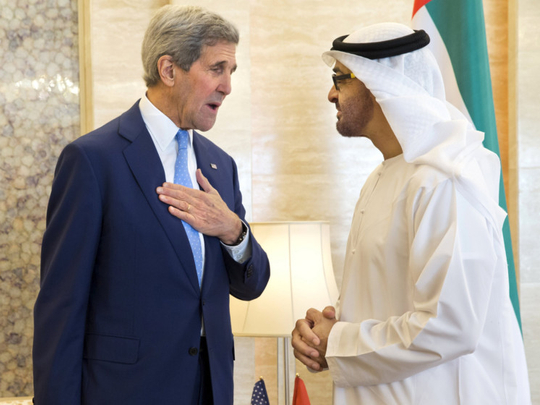
Abu Dhabi: US Secretary of State John Kerry travelled to the Gulf to support his Emirati and Saudi allies in their efforts to convince Syria’s rebel factions to agree a ceasefire with Bashar Al Assad’s regime.
“That’s why I’m here,” he told reporters, repeating his hope that a ceasefire between the opposition and the government could be struck “in a few weeks”.
“You can be confident that the diplomatic front is in high gear, with a very real plan on the table to be implemented.”
Kerry briefed His Highness Shaikh Mohammad Bin Zayed Al Nahyan, Crown Prince of Abu Dhabi and Deputy Supreme Commander of the UAE Armed Forces, on the outcomes of the Vienna talks on the Syrian crisis and the latest contacts by Washington with its allies to find solutions that would help put an end to the humanitarian, political and security crises.
Last month, 17 nations plus the United Nations, Arab League and European Union met in Vienna to set a framework for a ceasefire and peace talks to halt Syria’s civil war.
Meanwhile, Gulf leaders are to hold their annual summit on December 10 in the Saudi capital, three weeks before an international target date for bringing together Syria’s government and opposition.
A Saudi official confirmed on Monday that the heads of state of the six-member Gulf Cooperation Council will meet in Riyadh on December 10.
Major world powers have set January 1 as the date for talks on war-torn Syria to begin, along with a ceasefire.
Saudi Arabia, which supports some of the rebel forces on the battlefield, has taken charge of assembling a motley coalition of opposition exile groups and armed factions.
Kerry was keen to hear from Al Jubeir how this process is going and whether the key players would be ready for the January 1 target date for talks to begin.
These would exclude Daesh and the Al-Qaeda affiliated Al-Nusra Front.
However, they could draw in groups such as Al Nusra’s powerful Islamist ally Ahrar Al Sham.
Asked whether Washington was under pressure from European allies to work with Russia against Daesh, Kerry said some of them “were wondering whether it was possible.”
“And,” he added, “under the right circumstances the answer is ‘yes’, it’s possible, but we need to get the political process moving, we’re weeks away, maybe one or two weeks.”
But he warned that if “certain entities” think that by working with Russia the United States is helping Al Assad cling to power, that would imperil efforts to get rebels to the table.
“And then you’ll have greater support going to bad actors which ultimately could fuel greater growth in Nusra and Daesh,” he said.












